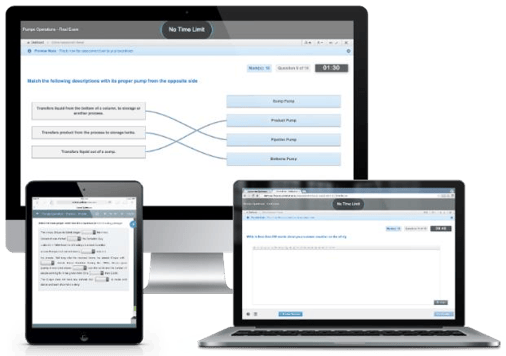The concept of “Bring Your Own Device” (BYOD) has entered various aspects of our lives, including education and workplace assessments. BYOD concept allow individuals to use their personal devices like laptops, tablets, or smartphones for examinations and evaluations.
Unfortunately, many institutions lack the resources or space to be able to run assessments in dedicated computer labs. This has motivated the development of bring-your-own-device (BYOD) exam formats, allowing students to program in a similar environment to how they learnt, but presenting instructors with significant additional challenges in preventing plagiarism and cheating.
While this approach offers flexibility and convenience, it also presents a unique set of challenges. In this blog, we will discover the challenges associated with conducting BYOD assessments and explore some innovative solutions to address them.
Contents
Challenges of BYOD Assessments
- Device Diversity: The BYOD model inherently involves a wide variety of devices with varying specifications, screen sizes, and operating systems. This diversity can create compatibility issues that affect the assessment experience.
- Security Concerns: Maintaining the security and integrity of assessments is a major concern. Ensuring that test-takers do not engage in cheating, unauthorized access, or data breaches is a constant challenge.
- Consistency and Fairness: Achieving consistency and fairness in assessments across different devices can be a considerable challenge. Variations in screen size and performance can lead to different user experiences, potentially affecting the impartiality of the evaluation.

Innovative Solutions for BYOD Assessment Challenges
Despite potential challenges such as device diversity, security concerns, consistency, and technical support, innovative solutions are here to address them, ensuring a seamless and secure assessment experience. Leveraging responsive design, robust security measures enables educational institutions, corporations, and organizations to adopt BYOD assessments as a valuable tool for learning and evaluation.
As we continue to navigate the ever-evolving landscape of education and assessment, these solutions help us unlock the true potential of BYOD assessments while ensuring their reliability and integrity.
Let’s delve deeper into these characteristics:
- Seamless Device Compatibility: At GamaLearn we understand the diverse needs of students, particularly those from underprivileged countries. By supporting a wide range of devices, including phones, tablets, virtual desktops, and physical machines, SwiftAssess eliminates the need for dedicated labs and costly hardware investments. Whether students prefer iOS, Linux, Windows, macOS, or Android devices, our platform ensures compatibility across platforms, fostering a personalized and inclusive educational environment.
- Leveraging Market Share Data: Understanding the market share disparity between Android and iOS devices is crucial for decision-makers when selecting an assessment management platform. SwiftAssess not only supports one-to-one devices, such as Android tablets but also Google Chromebooks that integrate Android functionality. By harnessing this information, institutions can optimize their BYOD policies to cater to the predominant device preferences of their students.
- Offline BYOD Policy: Unlike traditional BYOD policies dependent on external regulations, SwiftAssess offers an offline and accessible BYOD policy. This approach ensures that institutions have full control over their BYOD initiatives, independent of external factors. The platform empowers institutions to tailor such policies to their unique needs and preferences, enhancing flexibility and autonomy.
- Proctoring on Any Device: SwiftAssess goes beyond traditional assessment management platforms by offering proctoring capabilities on any device. Leveraging the power of AI, ensures secure and reliable proctoring, regardless of the device used. This feature enhances exam integrity and provides peace of mind for both institutions and students.
- Support for Teachers and Staff: BYOD isn’t limited to students, it extends to teachers and staff who may work from home or within the institution. The platform extends its support to educators through features like SwiftAssess Observer, enabling seamless assessment management from any location. This flexibility enhances productivity and collaboration among faculty members.
- Lowering the Barrier to Tool Adoption: BYOD policies significantly reduce the barrier to tool adoption for institutions. The platform facilitates easy integration and usage across various devices, empowering institutions to embrace modern assessment practices without significant investment or infrastructure changes.

When it comes to BYOD, there’s no one-size-fits-all solution. Every company must carefully consider the cost advantages in contrast to the tangible security risks and support complexities.
Navigating the challenges of BYOD assessments requires a proactive and innovative approach. As technology becomes increasingly integrated into our educational systems, it’s crucial to adapt and find solutions that harness the potential of student-owned devices.
With SwiftAssess, educational institutions can transcend physical boundaries and embrace the concept of anytime, anywhere learning. By removing barriers to access and providing seamless device compatibility, SwiftAssess empowers students and educators to engage in learning activities from any location, at any time. This flexibility not only enhances educational outcomes but also fosters a culture of lifelong learning and continuous improvement.
Embracing BYOD assessments with SwiftAssess enables institutions to unlock the full potential of modern education while overcoming the complexities of device diversity and security concerns.





